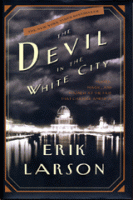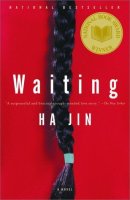I know what you’re thinking—what does he mean by final when he hasn’t written anything on Oscar Wao? Sorry, but it’s been a busy (and lazy) month. January is Korean schools’ winter break, so I’ve been teaching some classes outside of school and using the rest of the time doing other things. Last week I finally received my copy of Ha Jin’s Waiting, but I’ve been waiting to start on it because I hadn’t posted about Oscar yet. So here are my (very general) thoughts on Junot Díaz’s The Brief Wondrous Life of Oscar Wao, because I need to put them down and let the book go in order to start on another novel (I am male; I can only do one thing at a time). I promise I will do a better job of blogging with the second novel.
I must admit that I was slightly overwhelmed by all the sci-fi/fantasy references. Personally, I’m not that into stories that come out of that genre (besides Harry Potter; I love Harry Potter), which is kind of strange because I grew up watching a lot of Thundercats, X-Men, My Little Pony, Sailor Moon, and Voltron. But none of those things were referenced in Oscar…perhaps I like the lower echelon of sci-fi/fantasy (::shrug::)? Besides the occasional allusions to Lord of the Rings, Ray Bradbury, and Greek mythology, I got nothing. Lord knows I would’ve gotten, I don’t know, 300% more out of the novel had I been born a geek or had done research as I read.
Nevertheless, I found the novel fascinating. Not only were the (at times verbose) footnotes educational, they were also fun to read; I learned a lot about the Dominican Republic, which is great because it’s one of those countries I knew existed, but I knew very little about. Not anymore! On a related note, I did find Díaz’s in-your-face attitude borderline self-important (not to mention obnoxious). Yes, Rafael Trujillo was an evil dictator, but how many evil dictators did the world allow the world to have? Many (Hitler, Kim Jong-Il, Pol Pot, etc.); what makes Trujillo so special? I suppose the biting tone is credited to the fact that, well, not many Americans know about Trujillo (me included). And Díaz is right in being all, “Dammit, people. You need to know this!” Like Kate mentioned in an earlier post, I find it amazing that this book was a bestseller. It’s a real testament to the novel’s vibrancy and strong writing, given the historical aspect of the story. Because of this novel, so many of us (me included) now have a whiff of what it means to be from the Dominican Republic.
It’s funny—I was reading the novel at school one day and a co-worker asked me what it was about. I read the back cover text to her and, because she’s an English teacher, she replied, “That sounds like Holes.” And she’s right. We have this multi-generational story about one family and this curse, this fukú, that attaches itself to future offspring. I love that all of these ancient cultures, like the Egyptians and the Spanish and the Chinese, all believe in curses. Do Americans believe in curses? The curse of the Hope Diamond. The 27 Club. And a whole bunch related to sports. They sound frivolous, right? The fukú is, at the very least, a gimmick, but it’s a gimmick that works really well in the novel. It gives the novel its shape, its mystical quality, and elevates it into something greater…(can’t put my finger on it).
If I read the novel correctly (correct me if I’m wrong), then it all started with poor Abelard, a brilliant doctor and Oscar’s grandfather, and the moment he dissed Rafael Trujillo. That one mistake cost him and his family everything. Díaz does something interesting here with Abelard’s story, by placing it well into the novel in Part II. Would the storytelling be greatly differently if told in a linear fashion? Of course. It’s like in Amy Tan’s The Joy Luck Club, where the structure jumps between the daughters’ and the mothers’ vignettes. The juxtaposition of the past and present create a tension (slash dimension) in the overall story, and forces us to create parallels between the various periods. And that’s precisely what we get in Oscar Wao. In order for us to understand the effects of the past, we must know the present; in order for us to follow the present, we must understand the past. The novel would be all wrong if it unfolded in chronological order.
Díaz tells the story through the perspectives of various characters. I personally loved Lola’s storyline because there was a very modern feeling of angst in her sections. How she changed from being a good girl into a bad one. How she ran away from home. How she became a responsible mother in the end. Without knowing all of her (I believe the author is respectfully distant in Lola’s sections), I got a great sense of who she was as a person (more so than the other characters). Plus, she reminded me a lot of my older, cooler sister.
The richest (and maybe not so incidentally, the longest) chapter is “Chapter Three: The Three Heartbreaks of Belicia Cabral (1955-1962).” I could not put the book down as I read about Beli’s (unbelievably turbulent) life. The boys, prep school, the bakery, the Gangster, the baby, the beating to end all beatings in the field of sugar canes (can we say vivid?), and the first sighting of the mongoose. I found the images of the men without faces (harbinger of Death?) truly disturbing (I recently caught a few minutes of Eternal Sunshine of the Spotless Mind and saw people without faces—scary!). How a woman was able to live through all that and come out the other side alive, is inspiring. Which leads me to another question, and please free to make fun of me for this dumb-ass question: These characters are fictional, right? Because the details of the family and how they are intricately woven into the Dominican history lesson is convincingly real to me. [Okay, I just checked Wikipedia and it tells me that this story is fictional, minus the history stuff.] Did anyone else wonder while they were reading—shit, is this for real?
Part 2 tomorrow.



